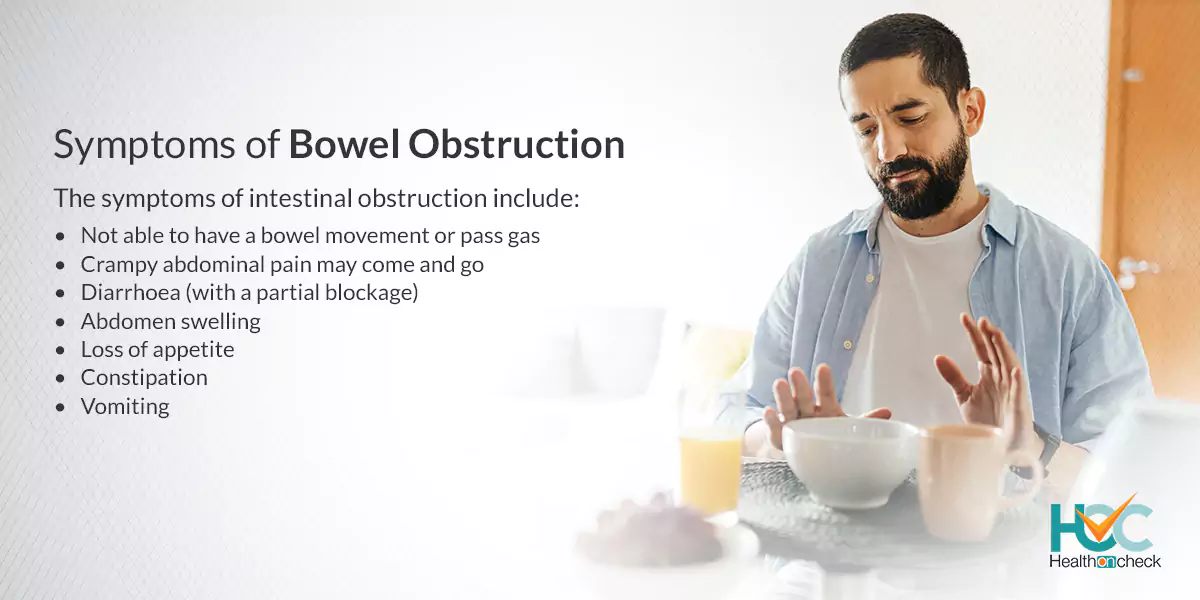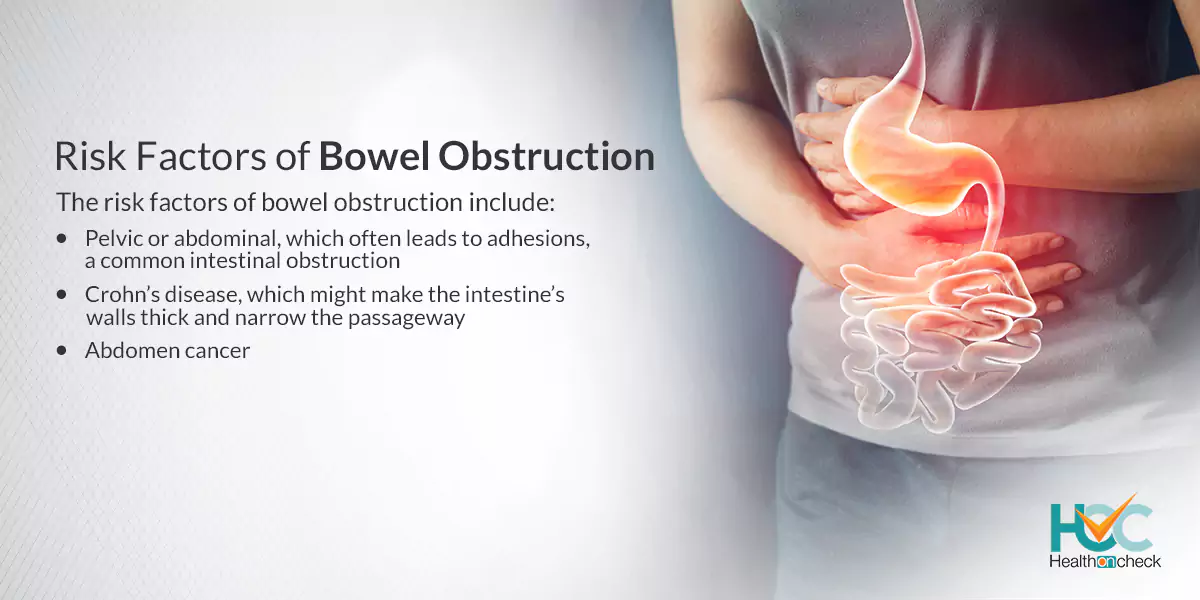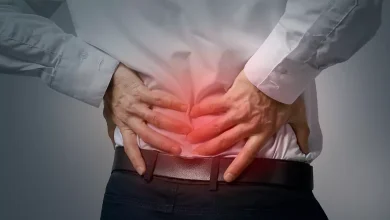What is Bowel Obstruction?

What is Bowel Obstruction?
A bowel obstruction also known as intestinal obstruction is a serious condition that occurs when your bowels, either your large or small intestine are blocked by something. You can’t have a bowel movement or pass gas when your digestive system comes to a grinding stoppage. You may also experience stomach pain and a swollen belly because of this condition. A common type of blockage is called faecal impaction which occurs when a big, hard mass of stool gets stuck in your digestive tract and can’t get pushed out the normal way. But when your bowel is blocked by something other than hard stool, it’s known as a bowel obstruction.
What are the Types of Bowel Obstruction?
A bowel obstruction can be either a partial blockage or a complete blockage. You can also have what’s called a pseudo-obstruction. This happens when you have symptoms of bowel obstruction but nothing is happening physically causing any kind of blockage. It might occur due to problems with your gastrointestinal muscles or with the nerves controlling them.
What are the Symptoms of Bowel Obstruction?
The symptoms of intestinal obstruction include:
– Crampy abdominal pain may come and go
– Loss of appetite
– Constipation
– Vomiting
– Not able to have a bowel movement or pass gas
– Abdomen swelling
– Diarrhoea (with a partial blockage)
What are the Causes of Bowel Obstruction?
The most common causes of bowel obstruction in adults are:
– Intestinal adhesions
When groups of fibrous tissue in the abdominal cavity start forming after abdominal or pelvic surgery.
– Hernias
Bowel obstruction might develop after portions of the intestine start protruding into another part of your body because of a hernia.
– Colon cancer
Colon cancer can also cause bowel obstruction.
– Other diseases
Other inflammatory bowel diseases, including Crohn’s disease, might also cause bowel obstruction.
– Diverticulitis
Bowel obstruction might occur because of a condition called diverticulitis where small, bulging pouches (diverticula) in the digestive tract become infected or inflamed.
– Twisting of the colon (volvulus) and impacted faeces can also cause bowel obstruction.
– Impacted faeces
You can develop pseudo-obstruction where signs and symptoms of bowel obstruction might occur, but a physical blockage does not happen because of:
– Infection
– Specific medicines affecting muscles and nerves, like antidepressants and opioids
– Muscle and nerve disorders, including Parkinson’s disease
In children, bowel obstruction usually occurs because of telescoping of the intestine (intussusception).
What are the Risk Factors of Bowel Obstruction?
The risk factors of bowel obstruction include:
– Pelvic or abdominal, which often leads to adhesions, a common intestinal obstruction.
– Crohn’s disease, which might make the intestine’s walls thick and narrow the passageway.
– Abdomen cancer.
What are the Complications of Bowel Obstruction?
If bowel obstruction is left untreated then it can cause severe, life-threatening complications, including:
– Tissue death
The blood supply to your intestine can be cut off because of bowel obstruction. Lack of blood can cause death of the intestine which causes a tear (perforation) in the intestinal wall, which might result in infection.
– Infection
Bowel obstruction can cause peritonitis, an infection in the abdominal cavity which is a life-threatening condition that needs prompt medical and often surgical assistance.
How Bowel Obstruction Is Diagnosed?
Tests and procedures to diagnose bowel obstruction include:
– Physical exam
Here, at first, your doctor will inquire about your medical history and your symptoms along with carrying out a physical exam to check your condition. A bowel obstruction is suspected if your abdomen is tender or swollen or tender or if there’s a lump in your abdomen. Your doctor also might use a stethoscope to listen for bowel sounds.
– X-ray
Your doctor might prescribe an abdominal X-ray to confirm a diagnosis of intestinal obstruction. However, some bowel obstructions can’t be detected through standard X-rays.
– Computerised tomography (CT)
A combination of a series of X-ray images taken from different angles is used during a computed tomography (CT) scan to produce cross-sectional images. These images are more detailed as compared to a standard X-ray and are more accurate to diagnose a bowel obstruction.
– Ultrasound
Ultrasound is preferred to diagnose bowel obstruction in children. In children when an intussusception is used, an ultrasound will usually show a “bull’s-eye,” which represents the intestine coiled within the intestine.
– Air or barium enema
An air or barium enema helps to see enhanced imaging of the colon. This might be done in cases of some suspected causes of obstruction. An air or liquid barium is inserted into the colon through the rectum in this process. For intussusception in children, an air or barium enema usually cures the problem most of the time, and no further treatment is required.
What are the Treatment Options Available for Bowel Obstruction?
Treatments for bowel obstructions include:
– IV fluid replacement
IV fluids and electrolytes are used to treat dehydration that usually comes with a bowel obstruction.
– Medications
Anti-nausea medicine and pain relievers are given to make you more comfortable and relieve your pain.
– Nasogastric tube
Here a long, thin tube is inserted through your nose into the stomach or intestine. It suctions out fluids which get accumulated due to the blockage.
– Barium enema
It is an endoscopic procedure that detects a blockage and it can also be used to treat some problems like a twisted intestine.
– Surgery
Surgery is done to remove adhesions or tumours that are causing a blockage. Surgery can be done to fix a hernia that might be causing your bowel obstruction. A stent (a mesh tube) might be fixed in your affected intestine to keep the intestine open. A segment of the damaged or dead intestine is removed though it’s rare.
Living with Bowel Obstruction
A bowel obstruction is a serious medical emergency that requires hospitalisation most of the time but all bowel obstructions do not need surgery. Your doctor can treat dehydration by draining the extra fluid and prevent more serious complications. Most people with bowel obstructions improve after treatment. Their bowels again start to function normally and they can lead a normal life.
Whom to Consult?
Bowel obstruction can cause serious medical complications some of which can be life-threatening also. You should consult your doctor and seek immediate medical attention if you have severe abdominal pain or other symptoms of bowel obstruction.






